Entrepreneurship and Venture Capital
VerifiedAdded on 2023/06/10
|7
|1471
|151
AI Summary
This essay discusses the specific entrepreneurial skills, abilities and personality traits required to become an entrepreneur or innovator. It emphasizes the importance of self-development and self-directed learning in order to inculcate distinct qualities to emerge as successful and competent entrepreneurs.
Contribute Materials
Your contribution can guide someone’s learning journey. Share your
documents today.
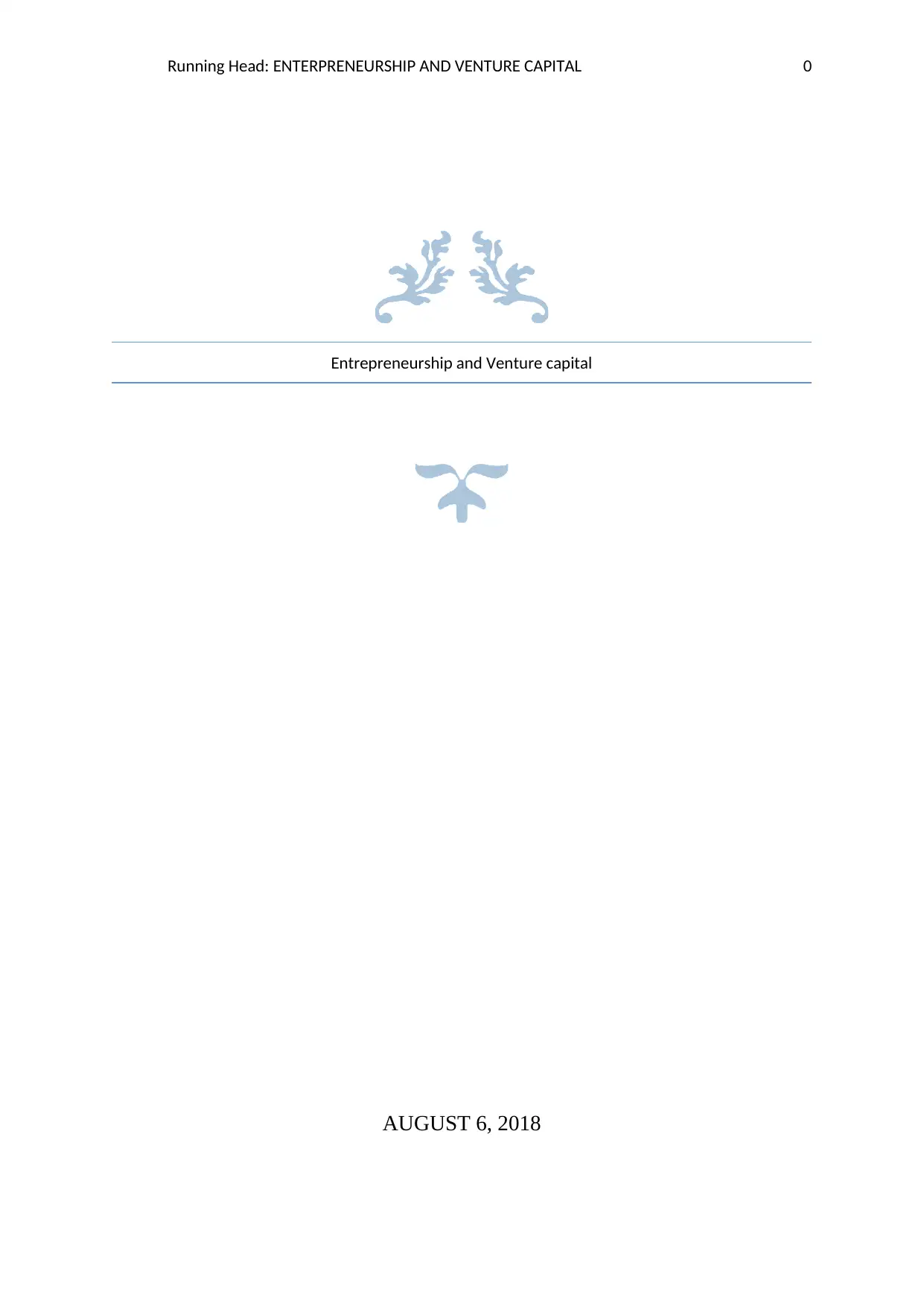
Running Head: ENTERPRENEURSHIP AND VENTURE CAPITAL 0
Entrepreneurship and Venture capital
AUGUST 6, 2018
Entrepreneurship and Venture capital
AUGUST 6, 2018
Secure Best Marks with AI Grader
Need help grading? Try our AI Grader for instant feedback on your assignments.
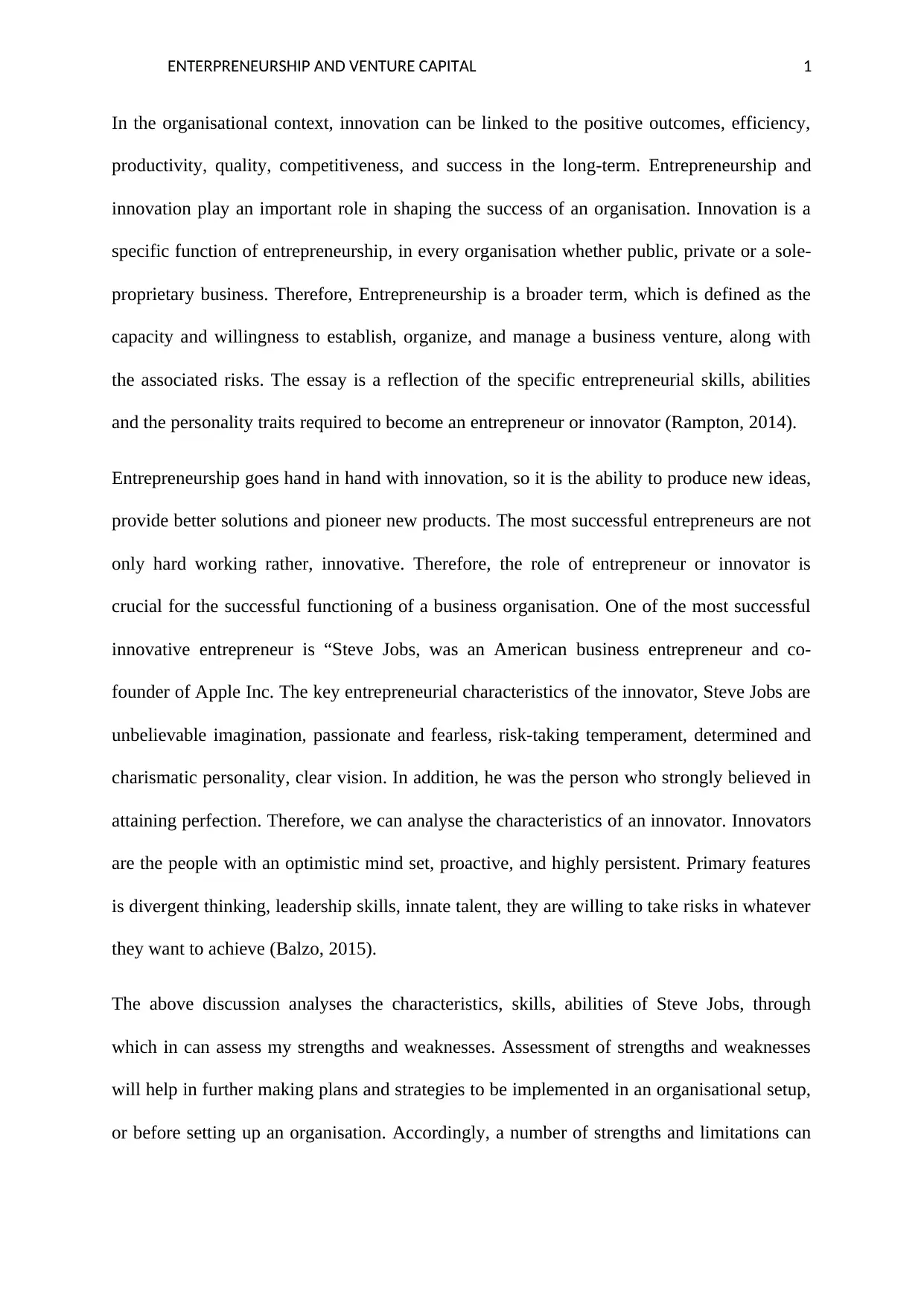
ENTERPRENEURSHIP AND VENTURE CAPITAL 1
In the organisational context, innovation can be linked to the positive outcomes, efficiency,
productivity, quality, competitiveness, and success in the long-term. Entrepreneurship and
innovation play an important role in shaping the success of an organisation. Innovation is a
specific function of entrepreneurship, in every organisation whether public, private or a sole-
proprietary business. Therefore, Entrepreneurship is a broader term, which is defined as the
capacity and willingness to establish, organize, and manage a business venture, along with
the associated risks. The essay is a reflection of the specific entrepreneurial skills, abilities
and the personality traits required to become an entrepreneur or innovator (Rampton, 2014).
Entrepreneurship goes hand in hand with innovation, so it is the ability to produce new ideas,
provide better solutions and pioneer new products. The most successful entrepreneurs are not
only hard working rather, innovative. Therefore, the role of entrepreneur or innovator is
crucial for the successful functioning of a business organisation. One of the most successful
innovative entrepreneur is “Steve Jobs, was an American business entrepreneur and co-
founder of Apple Inc. The key entrepreneurial characteristics of the innovator, Steve Jobs are
unbelievable imagination, passionate and fearless, risk-taking temperament, determined and
charismatic personality, clear vision. In addition, he was the person who strongly believed in
attaining perfection. Therefore, we can analyse the characteristics of an innovator. Innovators
are the people with an optimistic mind set, proactive, and highly persistent. Primary features
is divergent thinking, leadership skills, innate talent, they are willing to take risks in whatever
they want to achieve (Balzo, 2015).
The above discussion analyses the characteristics, skills, abilities of Steve Jobs, through
which in can assess my strengths and weaknesses. Assessment of strengths and weaknesses
will help in further making plans and strategies to be implemented in an organisational setup,
or before setting up an organisation. Accordingly, a number of strengths and limitations can
In the organisational context, innovation can be linked to the positive outcomes, efficiency,
productivity, quality, competitiveness, and success in the long-term. Entrepreneurship and
innovation play an important role in shaping the success of an organisation. Innovation is a
specific function of entrepreneurship, in every organisation whether public, private or a sole-
proprietary business. Therefore, Entrepreneurship is a broader term, which is defined as the
capacity and willingness to establish, organize, and manage a business venture, along with
the associated risks. The essay is a reflection of the specific entrepreneurial skills, abilities
and the personality traits required to become an entrepreneur or innovator (Rampton, 2014).
Entrepreneurship goes hand in hand with innovation, so it is the ability to produce new ideas,
provide better solutions and pioneer new products. The most successful entrepreneurs are not
only hard working rather, innovative. Therefore, the role of entrepreneur or innovator is
crucial for the successful functioning of a business organisation. One of the most successful
innovative entrepreneur is “Steve Jobs, was an American business entrepreneur and co-
founder of Apple Inc. The key entrepreneurial characteristics of the innovator, Steve Jobs are
unbelievable imagination, passionate and fearless, risk-taking temperament, determined and
charismatic personality, clear vision. In addition, he was the person who strongly believed in
attaining perfection. Therefore, we can analyse the characteristics of an innovator. Innovators
are the people with an optimistic mind set, proactive, and highly persistent. Primary features
is divergent thinking, leadership skills, innate talent, they are willing to take risks in whatever
they want to achieve (Balzo, 2015).
The above discussion analyses the characteristics, skills, abilities of Steve Jobs, through
which in can assess my strengths and weaknesses. Assessment of strengths and weaknesses
will help in further making plans and strategies to be implemented in an organisational setup,
or before setting up an organisation. Accordingly, a number of strengths and limitations can
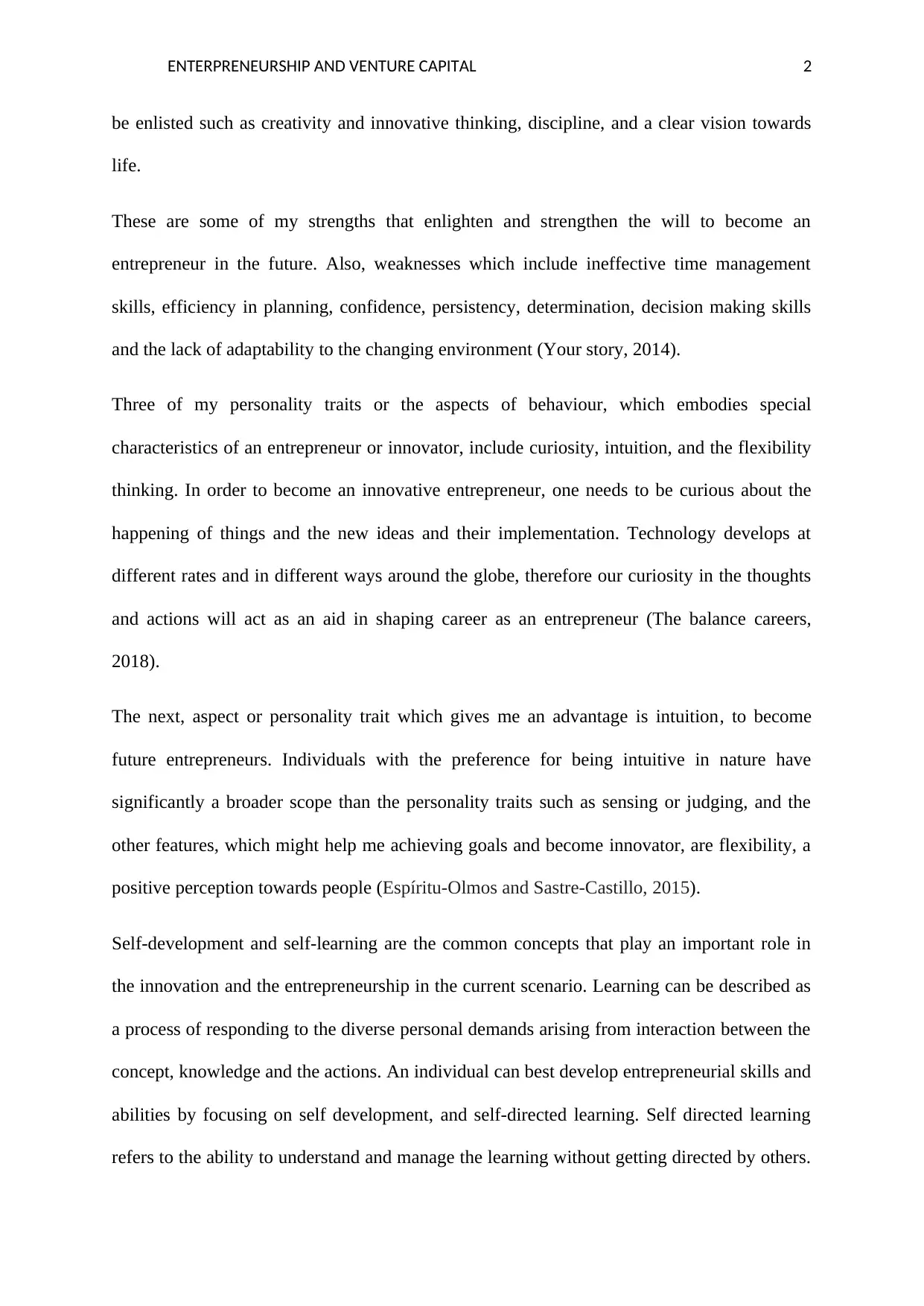
ENTERPRENEURSHIP AND VENTURE CAPITAL 2
be enlisted such as creativity and innovative thinking, discipline, and a clear vision towards
life.
These are some of my strengths that enlighten and strengthen the will to become an
entrepreneur in the future. Also, weaknesses which include ineffective time management
skills, efficiency in planning, confidence, persistency, determination, decision making skills
and the lack of adaptability to the changing environment (Your story, 2014).
Three of my personality traits or the aspects of behaviour, which embodies special
characteristics of an entrepreneur or innovator, include curiosity, intuition, and the flexibility
thinking. In order to become an innovative entrepreneur, one needs to be curious about the
happening of things and the new ideas and their implementation. Technology develops at
different rates and in different ways around the globe, therefore our curiosity in the thoughts
and actions will act as an aid in shaping career as an entrepreneur (The balance careers,
2018).
The next, aspect or personality trait which gives me an advantage is intuition, to become
future entrepreneurs. Individuals with the preference for being intuitive in nature have
significantly a broader scope than the personality traits such as sensing or judging, and the
other features, which might help me achieving goals and become innovator, are flexibility, a
positive perception towards people (Espíritu-Olmos and Sastre-Castillo, 2015).
Self-development and self-learning are the common concepts that play an important role in
the innovation and the entrepreneurship in the current scenario. Learning can be described as
a process of responding to the diverse personal demands arising from interaction between the
concept, knowledge and the actions. An individual can best develop entrepreneurial skills and
abilities by focusing on self development, and self-directed learning. Self directed learning
refers to the ability to understand and manage the learning without getting directed by others.
be enlisted such as creativity and innovative thinking, discipline, and a clear vision towards
life.
These are some of my strengths that enlighten and strengthen the will to become an
entrepreneur in the future. Also, weaknesses which include ineffective time management
skills, efficiency in planning, confidence, persistency, determination, decision making skills
and the lack of adaptability to the changing environment (Your story, 2014).
Three of my personality traits or the aspects of behaviour, which embodies special
characteristics of an entrepreneur or innovator, include curiosity, intuition, and the flexibility
thinking. In order to become an innovative entrepreneur, one needs to be curious about the
happening of things and the new ideas and their implementation. Technology develops at
different rates and in different ways around the globe, therefore our curiosity in the thoughts
and actions will act as an aid in shaping career as an entrepreneur (The balance careers,
2018).
The next, aspect or personality trait which gives me an advantage is intuition, to become
future entrepreneurs. Individuals with the preference for being intuitive in nature have
significantly a broader scope than the personality traits such as sensing or judging, and the
other features, which might help me achieving goals and become innovator, are flexibility, a
positive perception towards people (Espíritu-Olmos and Sastre-Castillo, 2015).
Self-development and self-learning are the common concepts that play an important role in
the innovation and the entrepreneurship in the current scenario. Learning can be described as
a process of responding to the diverse personal demands arising from interaction between the
concept, knowledge and the actions. An individual can best develop entrepreneurial skills and
abilities by focusing on self development, and self-directed learning. Self directed learning
refers to the ability to understand and manage the learning without getting directed by others.
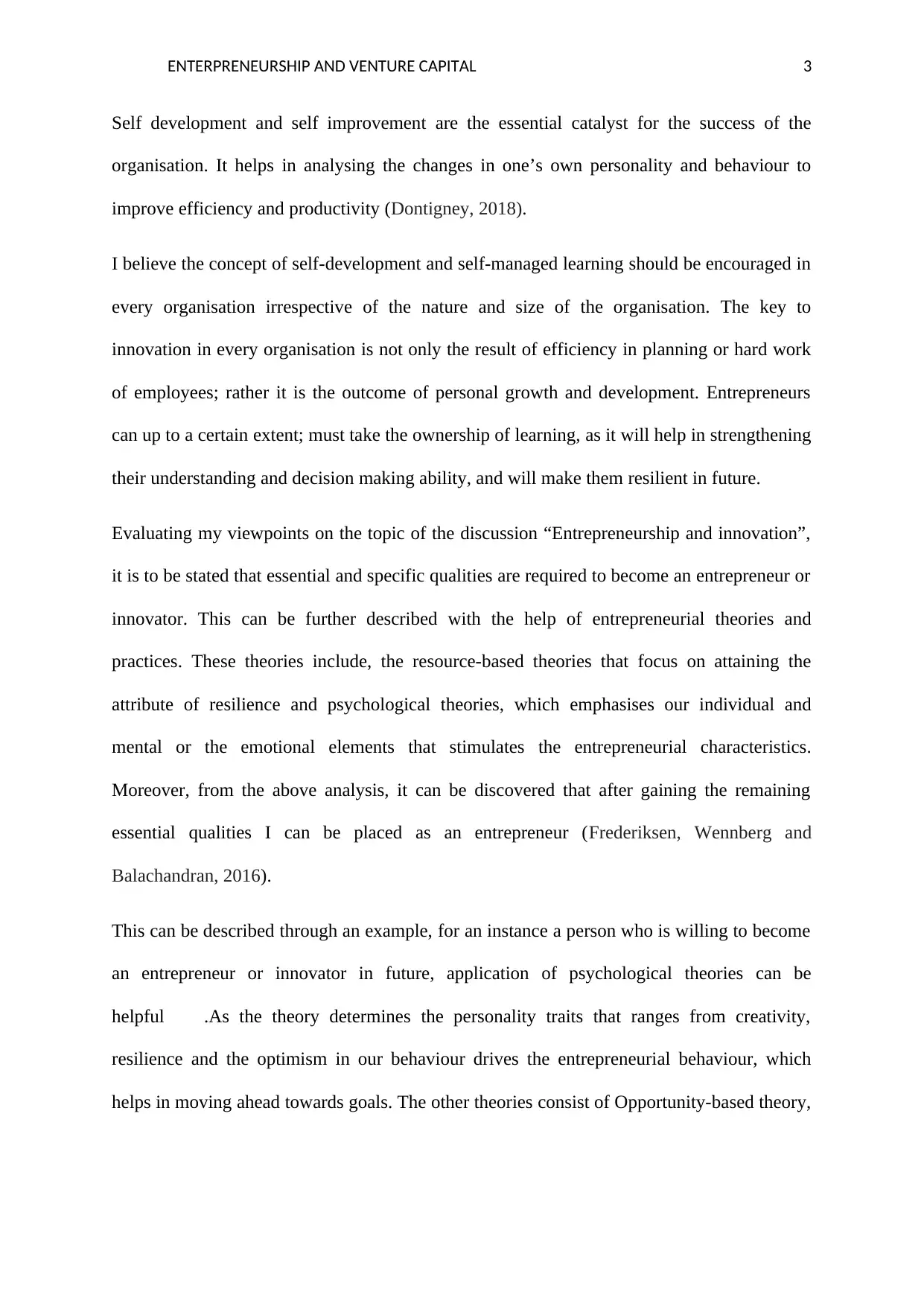
ENTERPRENEURSHIP AND VENTURE CAPITAL 3
Self development and self improvement are the essential catalyst for the success of the
organisation. It helps in analysing the changes in one’s own personality and behaviour to
improve efficiency and productivity (Dontigney, 2018).
I believe the concept of self-development and self-managed learning should be encouraged in
every organisation irrespective of the nature and size of the organisation. The key to
innovation in every organisation is not only the result of efficiency in planning or hard work
of employees; rather it is the outcome of personal growth and development. Entrepreneurs
can up to a certain extent; must take the ownership of learning, as it will help in strengthening
their understanding and decision making ability, and will make them resilient in future.
Evaluating my viewpoints on the topic of the discussion “Entrepreneurship and innovation”,
it is to be stated that essential and specific qualities are required to become an entrepreneur or
innovator. This can be further described with the help of entrepreneurial theories and
practices. These theories include, the resource-based theories that focus on attaining the
attribute of resilience and psychological theories, which emphasises our individual and
mental or the emotional elements that stimulates the entrepreneurial characteristics.
Moreover, from the above analysis, it can be discovered that after gaining the remaining
essential qualities I can be placed as an entrepreneur (Frederiksen, Wennberg and
Balachandran, 2016).
This can be described through an example, for an instance a person who is willing to become
an entrepreneur or innovator in future, application of psychological theories can be
helpful .As the theory determines the personality traits that ranges from creativity,
resilience and the optimism in our behaviour drives the entrepreneurial behaviour, which
helps in moving ahead towards goals. The other theories consist of Opportunity-based theory,
Self development and self improvement are the essential catalyst for the success of the
organisation. It helps in analysing the changes in one’s own personality and behaviour to
improve efficiency and productivity (Dontigney, 2018).
I believe the concept of self-development and self-managed learning should be encouraged in
every organisation irrespective of the nature and size of the organisation. The key to
innovation in every organisation is not only the result of efficiency in planning or hard work
of employees; rather it is the outcome of personal growth and development. Entrepreneurs
can up to a certain extent; must take the ownership of learning, as it will help in strengthening
their understanding and decision making ability, and will make them resilient in future.
Evaluating my viewpoints on the topic of the discussion “Entrepreneurship and innovation”,
it is to be stated that essential and specific qualities are required to become an entrepreneur or
innovator. This can be further described with the help of entrepreneurial theories and
practices. These theories include, the resource-based theories that focus on attaining the
attribute of resilience and psychological theories, which emphasises our individual and
mental or the emotional elements that stimulates the entrepreneurial characteristics.
Moreover, from the above analysis, it can be discovered that after gaining the remaining
essential qualities I can be placed as an entrepreneur (Frederiksen, Wennberg and
Balachandran, 2016).
This can be described through an example, for an instance a person who is willing to become
an entrepreneur or innovator in future, application of psychological theories can be
helpful .As the theory determines the personality traits that ranges from creativity,
resilience and the optimism in our behaviour drives the entrepreneurial behaviour, which
helps in moving ahead towards goals. The other theories consist of Opportunity-based theory,
Secure Best Marks with AI Grader
Need help grading? Try our AI Grader for instant feedback on your assignments.
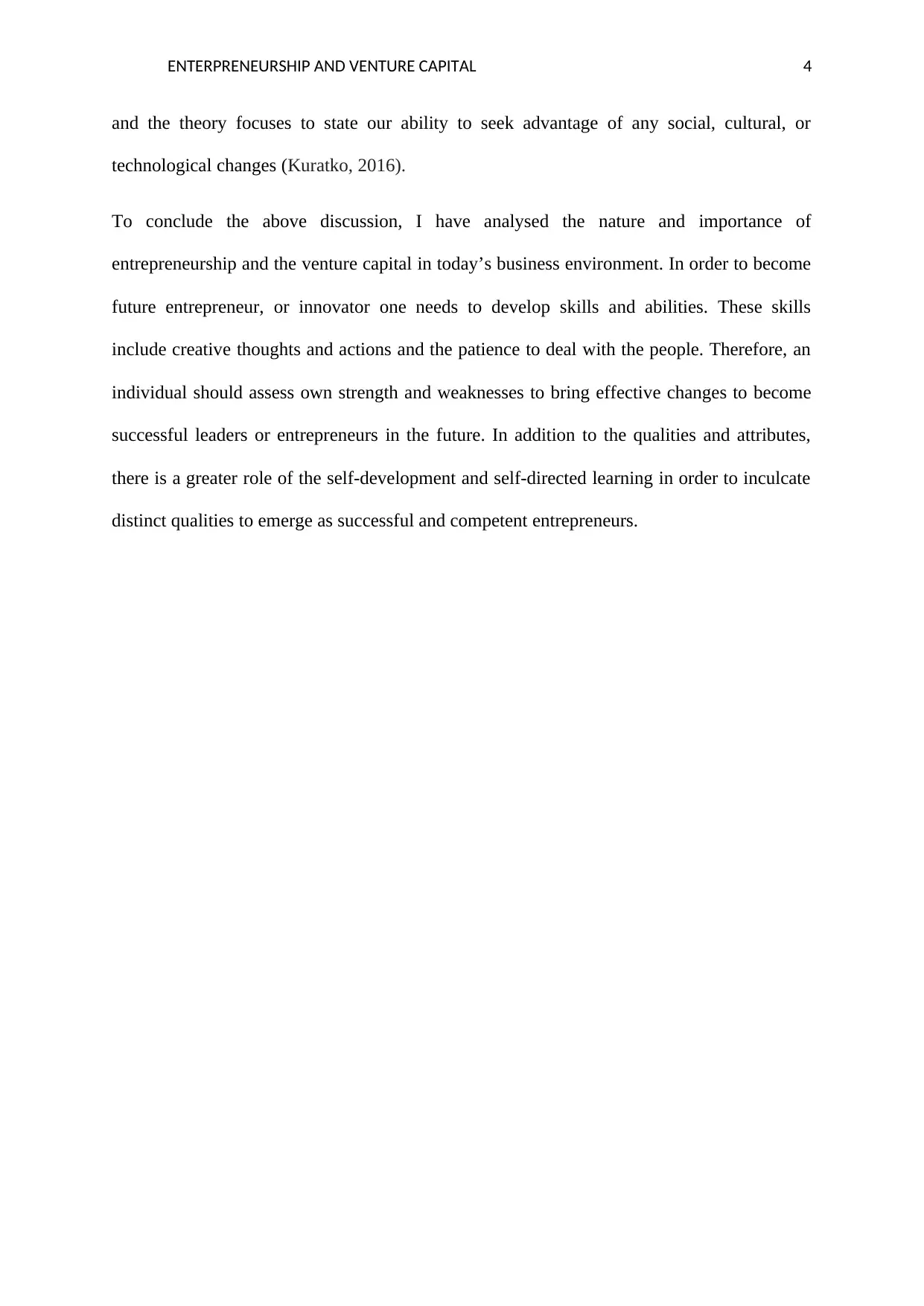
ENTERPRENEURSHIP AND VENTURE CAPITAL 4
and the theory focuses to state our ability to seek advantage of any social, cultural, or
technological changes (Kuratko, 2016).
To conclude the above discussion, I have analysed the nature and importance of
entrepreneurship and the venture capital in today’s business environment. In order to become
future entrepreneur, or innovator one needs to develop skills and abilities. These skills
include creative thoughts and actions and the patience to deal with the people. Therefore, an
individual should assess own strength and weaknesses to bring effective changes to become
successful leaders or entrepreneurs in the future. In addition to the qualities and attributes,
there is a greater role of the self-development and self-directed learning in order to inculcate
distinct qualities to emerge as successful and competent entrepreneurs.
and the theory focuses to state our ability to seek advantage of any social, cultural, or
technological changes (Kuratko, 2016).
To conclude the above discussion, I have analysed the nature and importance of
entrepreneurship and the venture capital in today’s business environment. In order to become
future entrepreneur, or innovator one needs to develop skills and abilities. These skills
include creative thoughts and actions and the patience to deal with the people. Therefore, an
individual should assess own strength and weaknesses to bring effective changes to become
successful leaders or entrepreneurs in the future. In addition to the qualities and attributes,
there is a greater role of the self-development and self-directed learning in order to inculcate
distinct qualities to emerge as successful and competent entrepreneurs.
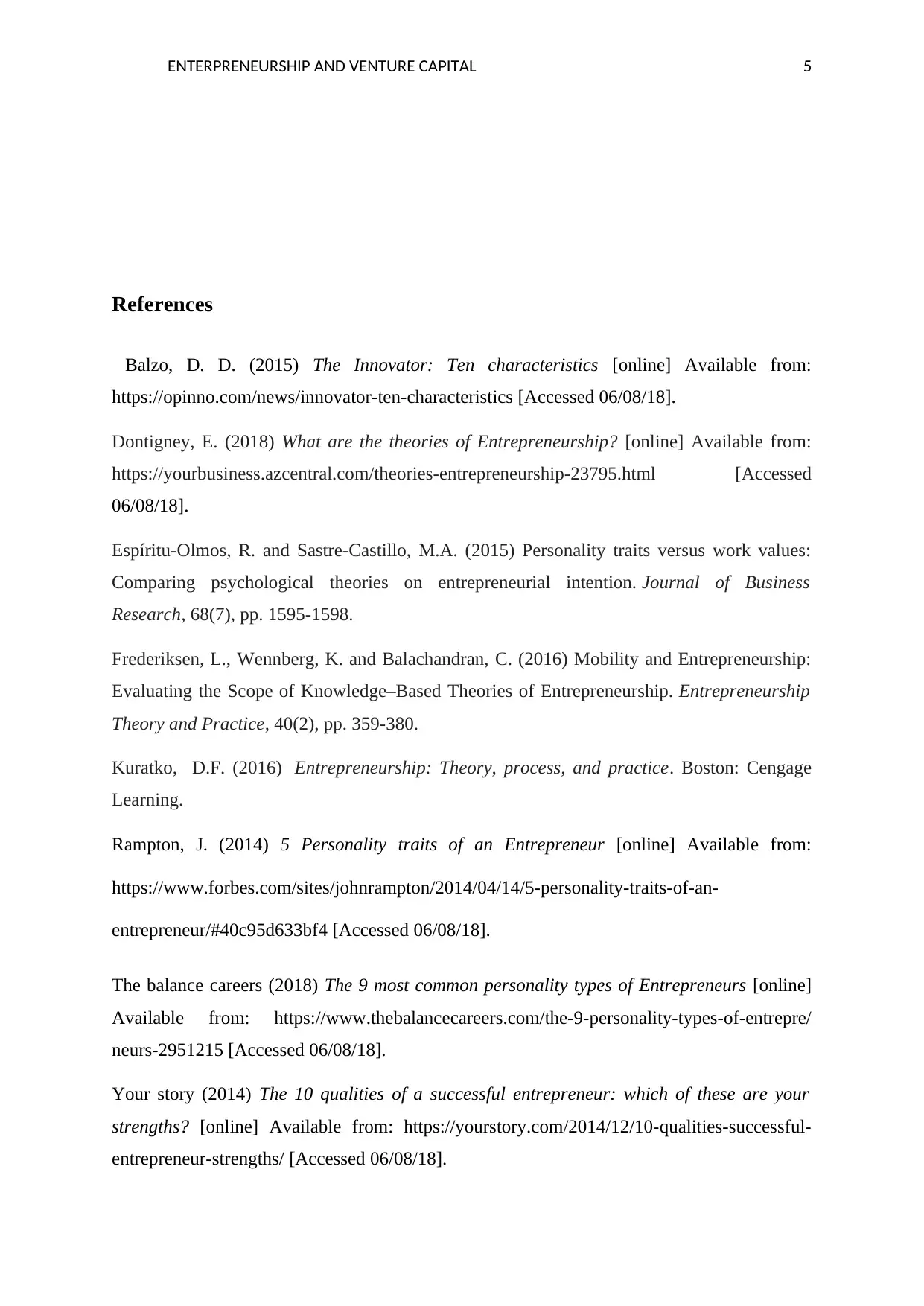
ENTERPRENEURSHIP AND VENTURE CAPITAL 5
References
Balzo, D. D. (2015) The Innovator: Ten characteristics [online] Available from:
https://opinno.com/news/innovator-ten-characteristics [Accessed 06/08/18].
Dontigney, E. (2018) What are the theories of Entrepreneurship? [online] Available from:
https://yourbusiness.azcentral.com/theories-entrepreneurship-23795.html [Accessed
06/08/18].
Espíritu-Olmos, R. and Sastre-Castillo, M.A. (2015) Personality traits versus work values:
Comparing psychological theories on entrepreneurial intention. Journal of Business
Research, 68(7), pp. 1595-1598.
Frederiksen, L., Wennberg, K. and Balachandran, C. (2016) Mobility and Entrepreneurship:
Evaluating the Scope of Knowledge–Based Theories of Entrepreneurship. Entrepreneurship
Theory and Practice, 40(2), pp. 359-380.
Kuratko, D.F. (2016) Entrepreneurship: Theory, process, and practice. Boston: Cengage
Learning.
Rampton, J. (2014) 5 Personality traits of an Entrepreneur [online] Available from:
https://www.forbes.com/sites/johnrampton/2014/04/14/5-personality-traits-of-an-
entrepreneur/#40c95d633bf4 [Accessed 06/08/18].
The balance careers (2018) The 9 most common personality types of Entrepreneurs [online]
Available from: https://www.thebalancecareers.com/the-9-personality-types-of-entrepre/
neurs-2951215 [Accessed 06/08/18].
Your story (2014) The 10 qualities of a successful entrepreneur: which of these are your
strengths? [online] Available from: https://yourstory.com/2014/12/10-qualities-successful-
entrepreneur-strengths/ [Accessed 06/08/18].
References
Balzo, D. D. (2015) The Innovator: Ten characteristics [online] Available from:
https://opinno.com/news/innovator-ten-characteristics [Accessed 06/08/18].
Dontigney, E. (2018) What are the theories of Entrepreneurship? [online] Available from:
https://yourbusiness.azcentral.com/theories-entrepreneurship-23795.html [Accessed
06/08/18].
Espíritu-Olmos, R. and Sastre-Castillo, M.A. (2015) Personality traits versus work values:
Comparing psychological theories on entrepreneurial intention. Journal of Business
Research, 68(7), pp. 1595-1598.
Frederiksen, L., Wennberg, K. and Balachandran, C. (2016) Mobility and Entrepreneurship:
Evaluating the Scope of Knowledge–Based Theories of Entrepreneurship. Entrepreneurship
Theory and Practice, 40(2), pp. 359-380.
Kuratko, D.F. (2016) Entrepreneurship: Theory, process, and practice. Boston: Cengage
Learning.
Rampton, J. (2014) 5 Personality traits of an Entrepreneur [online] Available from:
https://www.forbes.com/sites/johnrampton/2014/04/14/5-personality-traits-of-an-
entrepreneur/#40c95d633bf4 [Accessed 06/08/18].
The balance careers (2018) The 9 most common personality types of Entrepreneurs [online]
Available from: https://www.thebalancecareers.com/the-9-personality-types-of-entrepre/
neurs-2951215 [Accessed 06/08/18].
Your story (2014) The 10 qualities of a successful entrepreneur: which of these are your
strengths? [online] Available from: https://yourstory.com/2014/12/10-qualities-successful-
entrepreneur-strengths/ [Accessed 06/08/18].
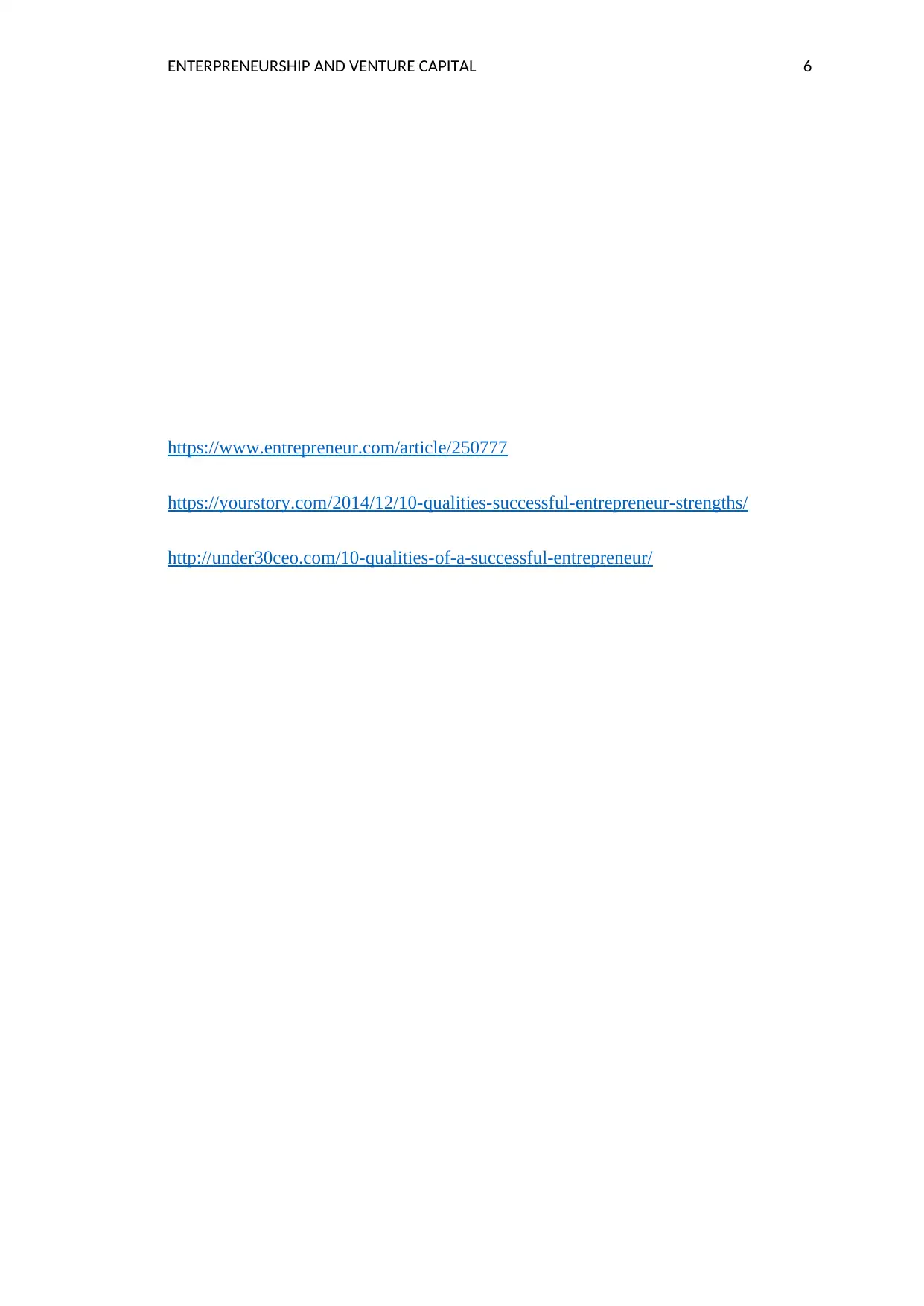
ENTERPRENEURSHIP AND VENTURE CAPITAL 6
https://www.entrepreneur.com/article/250777
https://yourstory.com/2014/12/10-qualities-successful-entrepreneur-strengths/
http://under30ceo.com/10-qualities-of-a-successful-entrepreneur/
https://www.entrepreneur.com/article/250777
https://yourstory.com/2014/12/10-qualities-successful-entrepreneur-strengths/
http://under30ceo.com/10-qualities-of-a-successful-entrepreneur/
1 out of 7
Your All-in-One AI-Powered Toolkit for Academic Success.
+13062052269
info@desklib.com
Available 24*7 on WhatsApp / Email
![[object Object]](/_next/static/media/star-bottom.7253800d.svg)
Unlock your academic potential
© 2024 | Zucol Services PVT LTD | All rights reserved.





